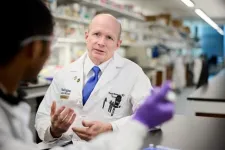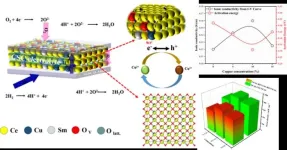(Press-News.org) The parts of the brain that are needed to remember words, and how these are affected by a common form of epilepsy, have been identified by a team of neurologists and neurosurgeons at UCL.
The new study, published in Brain Communications, found that shrinkage in the front and side of the brain (prefrontal, temporal and cingulate cortices, and the hippocampus) was linked to difficulty remembering words.
The new discovery highlights how the network that is involved in creating and storing word memories is dispersed throughout the brain.
This is particularly crucial for helping to understand conditions such as epilepsy, in which patients may have difficulty with remembering words. The researchers hope that their findings will help guide neurosurgical treatment for patients with epilepsy by helping surgeons to avoid parts of the brain important for language and memory, that may otherwise be affected, when doing operations.
Corresponding author, Professor John Duncan (UCL Queen Square Institute of Neurology) said: “Being able to remember and recall words is important for day-to-day memory to work well.
“Detailed MRI brain scans are used to find out the causes of epilepsy and can show if any parts of the brain are shrunken. By measuring the parts of the brain that are shrunken and how well a person can remember words, we can work out which parts of the brain are used for making and storing memories.
“In addition, if medication has not stopped seizures occurring, this helps us to guide neurosurgical treatment for a person’s epilepsy, to avoid damaging the parts of the brain that are needed for memory to work well.”
In the first study of its kind, the researchers examined 84 people with temporal lobe epilepsy (epilepsy arising from the temporal lobe at the sides of the head) and hippocampal sclerosis (a condition in which part of the brain is scarred, and memory is affected) and 43 healthy people.
The patients were divided into those with left-sided and right-sided hippocampal sclerosis.
High-resolution MRI scans were used to measure the size and shape of different parts of the brain, including the cerebral cortex (the outer layer of the brain responsible for thinking, memory, attention, perception, awareness, and language) and specific areas within the hippocampus (the part of the brain that helps with learning, memory, and spatial navigation).
All participants underwent standardised tests to assess their verbal memory. These tests were part of the Adult Memory and Information Processing Battery, which measures how well people can remember and recall words.
The researchers then compared the memory test scores to the sizes of different brain areas, to see if smaller brain parts were linked to worse memory.
They found that smaller sizes in certain brain areas, like the prefrontal, temporal and cingulate cortices, and parts of the hippocampus, were linked to worse memory for words in people with epilepsy arising in their temporal lobes.
These findings are also important for understanding how the brain organises and remembers words.
Lead author, Dr Giorgio Fiore (National Hospital for Neurology and Neurosurgery, UCLH) said: “This research is important as it helps us to understand how memory may fail and may help guide the designing of neurosurgical operations for epilepsy that will not make memory worse.”
This work was funded by the Epilepsy Research UK and supported by the National Institute for Health and Care Research University College London Hospitals Biomedical Research Centre (NIHR UCLH BRC).
END
Parts of the brain that are needed to remember words identified
Peer-reviewed | Experimental study | People
2025-03-20
ELSE PRESS RELEASES FROM THIS DATE:
Anti-amyloid drug shows signs of preventing Alzheimer’s dementia
2025-03-20
An experimental drug appears to reduce the risk of Alzheimer’s-related dementia in people destined to develop the disease in their 30s, 40s or 50s, according to the results of a study led by the Knight Family Dominantly Inherited Alzheimer Network-Trials Unit (DIAN-TU), which is based at Washington University School of Medicine in St. Louis. The findings suggest – for the first time in a clinical trial – that early treatment to remove amyloid plaques from the brain many years before symptoms arise can delay the onset of Alzheimer’s dementia.
The study is published March 19 in The Lancet Neurology.
The international study ...
Sharing mealtimes with others linked to better wellbeing
2025-03-20
UCL Press Release
Under embargo until Thursday 20th March, 00:01 UK time / Wednesday 19th March, 20:01 Eastern US time
Not peer reviewed | Literature review & data analysis | People
People who share more mealtimes with others are more likely to report higher levels of life satisfaction and wellbeing, finds research led by a UCL academic for the World Happiness Report.
In chapter three of the report, Sharing Meals with Others, the researchers from UCL, University of Oxford, Harvard University and Gallup found that meal sharing as an indicator ...
New DESI results: Evidence mounts for evolving dark energy
2025-03-19
A new analysis of data collected over three years by the Dark Energy Spectroscopic Instrument (DESI) collaboration provides even stronger evidence than the group’s previous datasets that dark energy, long thought to be a “cosmological constant,” might be evolving over time in unexpected ways.
Dr. Mustapha Ishak-Boushaki, professor of physics at The University of Texas at Dallas, is co-chair of the DESI working group that interprets cosmological survey data gathered by the international collaboration, which includes more than 900 researchers ...
New DESI results strengthen hints that dark energy may evolve
2025-03-19
The fate of the universe hinges on the balance between matter and dark energy: the fundamental ingredient that drives its accelerating expansion. New results from the Dark Energy Spectroscopic Instrument (DESI) collaboration use the largest 3D map of our universe ever made to track dark energy’s influence over the past 11 billion years. Researchers see hints that dark energy, widely thought to be a “cosmological constant,” might be evolving over time in unexpected ways.
DESI is an international experiment with more than 900 researchers from over 70 institutions around the world and is managed by the U.S. Department of Energy’s Lawrence Berkeley ...
DESI opens access to the largest 3D map of the universe yet
2025-03-19
The Dark Energy Spectroscopic Instrument (DESI) is mapping millions of celestial objects to better understand dark energy: the mysterious driver of our universe’s accelerating expansion. Today, the DESI collaboration released a new collection of data for anyone in the world to investigate. The dataset is the largest of its kind, with information on 18.7 million objects: roughly 4 million stars, 13.1 million galaxies, and 1.6 million quasars (extremely bright but distant objects powered by supermassive black holes at their cores).
While the experiment’s ...
New study reveals high levels of fusarium mycotoxins in seized cannabis from Arizona and California
2025-03-19
A recent study conducted by researchers from Arizona State University has uncovered alarming levels of Fusarium mycotoxins in illicit cannabis samples seized in Arizona and California.
The study found that 16% of the 118 samples tested positive for harmful mycotoxins, posing potential health risks to consumers. This groundbreaking research highlights the unregulated and dangerous nature of black-market cannabis.
The study, led by Arizona State University professor Maxwell Leung, analyzed cannabis samples obtained between November 2023 and June 2024 from law enforcement seizures. The samples ...
Sleepier during the day? For some older people, it’s linked to twice the dementia risk
2025-03-19
MINNEAPOLIS — For women in their 80s, experiencing increasing sleepiness during the day over a five-year period is associated with double the risk of developing dementia during that time, according to a study published on March 19, 2025, online in Neurology®, the medical journal of the American Academy of Neurology. The study does not prove that daytime sleepiness causes dementia; it only shows an association.
“Sleep is essential for cognitive health, as it allows the brain to rest and rejuvenate, enhancing our ability to think clearly and remember information,” said study author Yue Leng, PhD, of the University of California, San Francisco. “However, ...
Is increased sleepiness in our 80s tied to higher dementia risk?
2025-03-19
A study in Neurology, led by Yue Leng, PhD, and Sasha Milton, followed the sleep patterns of 733 older female participants to see if specific patterns of change were associated with a higher risk of dementia. The participants, whose average age was 83, were monitored by wrist devices that track movement and time spent asleep. They had normal cognition at the start of the study.
What They Discovered
At the end of the study, five years later, 13% had developed dementia. This included 25 participants (8%) with stable sleep patterns, 39 (15%) ...
South Africa and China establish record-breaking 12,900 km ultra-secure quantum satellite link
2025-03-19
Scientists from South Africa and China have successfully established the world’s longest intercontinental ultra-secure quantum satellite link, spanning 12,900 km. Using the Chinese quantum microsatellite Jinan-1, launched into low Earth orbit, this milestone marks the first-ever quantum satellite communication link established in the Southern Hemisphere.
In this demonstration, quantum keys were generated in real-time through Quantum Key Distribution (QKD), enabling the secure encryption of images transmitted between ground stations in China and South Africa via one-time pad encryption—considered unbreakable. The results from this pioneering ...
A rule-changer for ceramic fuel cells
2025-03-19
A joint research team from Southeast University and Shenzhen University has developed a novel function of semiconductor-ionic conductor (SIC) using a Cu-Sm co-doping ceria (SCDC). By enhancing ionic and electronic conductivity in the same time, the team is able to achieve superionic transport property and excellent fuel cell performance using the SIC electrolyte. It changes traditional pure ionic electrolyte to SIC with strong electron-ion coupling synergistic effect to obtain exceptional ionic conductivity and fuel cell performance. This study leads to a new way to develop advanced electrolytes and fuel cells in energy conversion technologies.
Ceramic ...
LAST 30 PRESS RELEASES:
Wildfire smoke linked to rise in violent assaults, new 11-year study finds
New technology could use sunlight to break down ‘forever chemicals’
Green hydrogen without forever chemicals and iridium
Billion-DKK grant for research in green transformation of the built environment
For solar power to truly provide affordable energy access, we need to deploy it better
Middle-aged men are most vulnerable to faster aging due to ‘forever chemicals’
Starving cancer: Nutrient deprivation effects on synovial sarcoma
Speaking from the heart: Study identifies key concerns of parenting with an early-onset cardiovascular condition
From the Late Bronze Age to today - Old Irish Goat carries 3,000 years of Irish history
Emerging class of antibiotics to tackle global tuberculosis crisis
Researchers create distortion-resistant energy materials to improve lithium-ion batteries
Scientists create the most detailed molecular map to date of the developing Down syndrome brain
Nutrient uptake gets to the root of roots
Aspirin not a quick fix for preventing bowel cancer
HPV vaccination provides “sustained protection” against cervical cancer
Many post-authorization studies fail to comply with public disclosure rules
GLP-1 drugs combined with healthy lifestyle habits linked with reduced cardiovascular risk among diabetes patients
Solved: New analysis of Apollo Moon samples finally settles debate about lunar magnetic field
University of Birmingham to host national computing center
Play nicely: Children who are not friends connect better through play when given a goal
Surviving the extreme temperatures of the climate crisis calls for a revolution in home and building design
The wild can be ‘death trap’ for rescued animals
New research: Nighttime road traffic noise stresses the heart and blood vessels
Meningococcal B vaccination does not reduce gonorrhoea, trial results show
AAO-HNSF awarded grant to advance age-friendly care in otolaryngology through national initiative
Eight years running: Newsweek names Mayo Clinic ‘World’s Best Hospital’
Coffee waste turned into clean air solution: researchers develop sustainable catalyst to remove toxic hydrogen sulfide
Scientists uncover how engineered biochar and microbes work together to boost plant-based cleanup of cadmium-polluted soils
Engineered biochar could unlock more effective and scalable solutions for soil and water pollution
Differing immune responses in infants may explain increased severity of RSV over SARS-CoV-2
[Press-News.org] Parts of the brain that are needed to remember words identifiedPeer-reviewed | Experimental study | People






